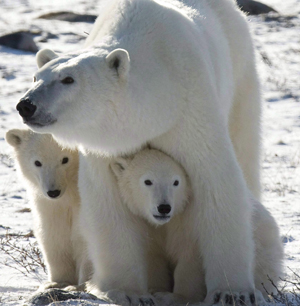Quebec Hunters Killed 12 Times More Polar Bears Than Last Year
 Hunters in Quebec have killed 12 times the usual number of polar bears they harvest in southern Hudson Bay this winter, leading a Canadian polar bear researcher to wonder if soaring prices for polar bear hides are to blame.
Hunters in Quebec have killed 12 times the usual number of polar bears they harvest in southern Hudson Bay this winter, leading a Canadian polar bear researcher to wonder if soaring prices for polar bear hides are to blame.
Hunters in Nunavik, a predominantly Inuit region in northern Quebec, harvested 47 polar bears in southern Hudson Bay in the last seven months, according to numbers obtained by CBC News.
On average, fewer than four polar bears were hunted every year for the last five years, according to the figures.
Ian Stirling, a longtime polar bear researcher at the University of Alberta, said he fears the recently soaring price of polar bear hides is driving the hunt.
“It’s an effort for a quick buck, and it’s certainly not sustainable,” Stirling told CBC News.
Stirling said the polar bear population in southern Hudson Bay is estimated at about 900 to 1,000 bears. That population is already being hit hard by poor sea ice conditions, he added.
In an email to CBC News, Quebec’s ministry of natural resources said the soaring price currently being paid for polar bear hides is one factor.
A ministry spokesperson said poor ice conditions have driven polar bears ashore in Nunavik, posing a safety threat in those communities.
Nunavut hunters worried
The latest numbers from Nunavik are also a concern to Inuit in neighbouring Sanikiluaq, Nunavut, who also hunt from the southern Hudson Bay polar bear population. Local hunters planned to meet on Friday to discuss the situation.
Lucassie Arragutainaq, chairman of Sanikiluaq’s hunters and trappers organization, said people in his community have heard even more polar bears may have been hunted in Nunavik.
“People talk and we’ve been hearing about 60-plus. This is a lot of more bears as far as we’re concerned, but it’s the same population that we’re hunting,” he said.
Hunters in Sanikiluaq have an annual harvest limit of 25 polar bears, whereas Nunavik has no fixed quota system.
The Quebec government spokesperson said officials are concerned about the elevated polar bear hunt in Nunavik, and they have already asked hunters in Inukjuak, Que., in particular to reduce their hunt.
Stirling said all parties involved must get together and come up with a long-term solution.
“Everybody should be concerned when you suddenly get a big increase like that, which is not sustainable,” he said.



